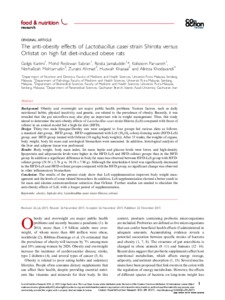Citation
Karimi, Golgis and Sabran, Mohd Redzwan and Jamaluddin, Rosita and Parvaneh, Kolsoom and Mohtarrudin, Norhafizah and Ahmad, Zuraini and Khazaai, Huzwah and Khodavandi, Alireza
(2015)
The anti-obesity effects of Lactobacillus casei strain shirota versus orlistat on high fat diet-induced obese rats.
Food & Nutrition Research, 59.
art. no. 29273.
pp. 1-9.
ISSN 1654-6628; ESSN: 1654-661X
Abstract
BACKGROUND:Obesity and overweight are major public health problems. Various factors, such as daily nutritional habits, physical inactivity, and genetic, are related to the prevalence of obesity. Recently, it was revealed that the gut microflora may also play an important role in weight management. Thus, this study aimed to determine the anti-obesity effects of Lactobacillus casei strain Shirota (LcS) compared with those of orlistat in an animal model fed a high-fat diet (HFD).
DESIGN:Thirty-two male Sprague-Dawley rats were assigned to four groups fed various diets as follows: a standard diet group, HFD group, HFD supplemented with LcS (108109 colony-forming units (HFD-LcS) group, and HFD group treated with Orlistat (10 mg/kg body weight)). After 15 weeks, the weights of organs, body weight, body fat mass and serological biomarkers were measured. In addition, histological analysis of the liver and adipose tissue was performed.
RESULTS:Body weight, body mass index, fat mass, leptin and glucose levels were lower, and high-density lipoprotein and adiponectin levels were higher in the HFD-LcS and HFD-orlistat groups than in the HFD group. In addition a significant difference in body fat mass was observed between HFD-LcS group with HFD-orlistat group (19.19±5.76 g vs. 30.19±7.98 g). Although the interleukin-6 level was significantly decreased in the HFD-LcS and HFD-orlistat groups compared with the HFD group, no significant change was observed in other inflammatory biomarkers.
CONCLUSION:The results of the present study show that LcS supplementation improves body weight management and the levels of some related biomarkers. In addition, LcS supplementation showed a better result in fat mass and alanine aminotransferase reduction than Orlistat. Further studies are needed to elucidate the anti-obesity effects of LcS, with a longer period of supplementation.
Download File
![[img]](http://psasir.upm.edu.my/46520/1.hassmallThumbnailVersion/The%20anti-obesity%20effects%20of%20Lactobacillus%20casei%20strain%20shirota%20versus%20orlistat%20on%20high%20fat%20diet-induced%20obese%20rats.pdf)  Preview |
|
Text
The anti-obesity effects of Lactobacillus casei strain shirota versus orlistat on high fat diet-induced obese rats.pdf
Download (1MB)
| Preview
|
|
Additional Metadata
Actions (login required)
 |
View Item |

